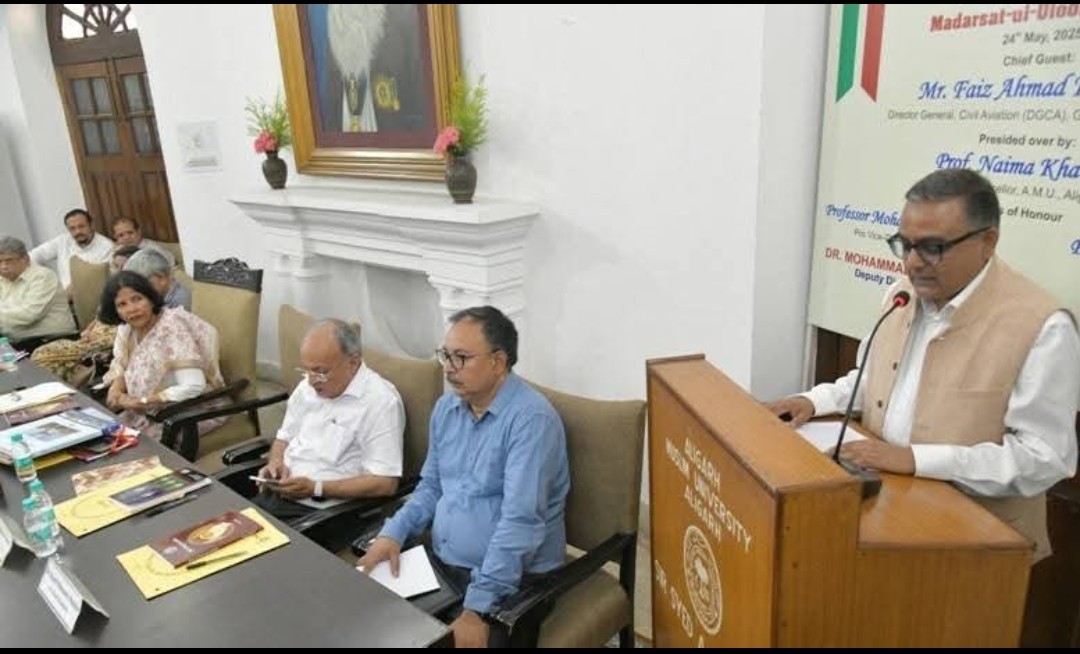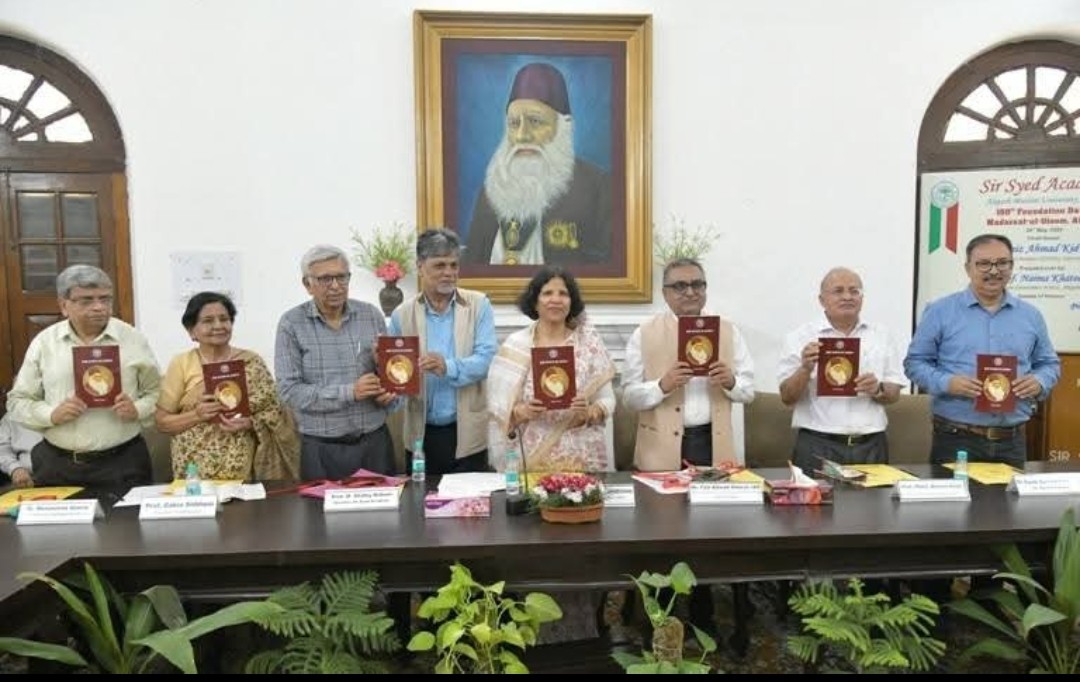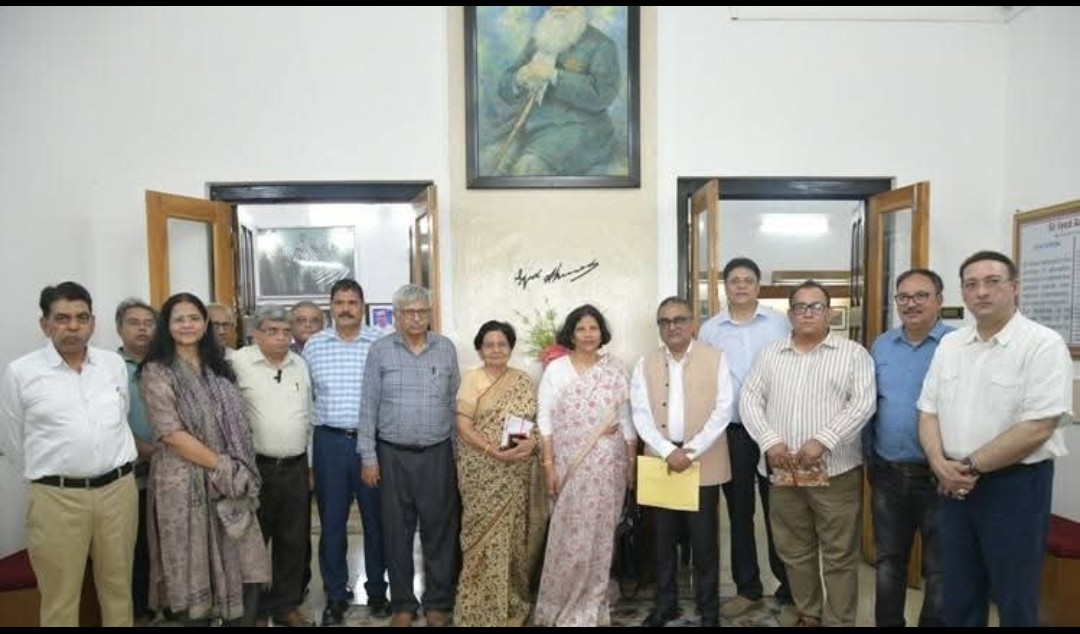AMU Commemorates 150th Foundation Day of Madarsat-ul-Uloom at Sir Syed Academy
AMU Commemorates 150th Foundation Day of Madarsat-ul-Uloom at Sir Syed Academy
Aligarh, May 24: Aligarh Muslim University (AMU) celebrated a historic milestone with the 150th Foundation Day of Madarsat-ul-Uloom, the pioneering institution established by Sir Syed Ahmad Khan in 1875, which later evolved into the Muhammadan Anglo-Oriental (MAO) College and eventually AMU in 1920. The ceremony, held at the Sir Syed Academy, was marked by rich tributes, reflective speeches, and a reaffirmation of the university's founding vision of educational upliftment.
Delivering the keynote address, Chief Guest Mr. Faiz Ahmad Kidwai, IAS, Director General of Civil Aviation (DGCA), Government of India and AMU alumnus, eloquently traced the transformation of Madarsat-ul-Uloom into MAO College in 1877, and subsequently into one of India’s leading institutions of higher education.
“We cannot fully appreciate the historical importance of this institution without first recognising the humble madrasa that laid the groundwork,” said Mr. Kidwai. “Without those initial steps, without those first brave students and teachers, MAO College and later AMU, might never have emerged. This was not the end of a journey, but the beginning of many more.”
Highlighting the architectural brilliance and academic excellence of MAO College, Mr. Kidwai noted that its inclusive intellectual culture attracted renowned professors from Oxford and Cambridge, fostering rich academic and cultural exchanges.
He stressed that Sir Syed’s mission extended beyond education, though education was its core. He contextualized Sir Syed’s efforts as a response to the socio-political transformations following the 1857 revolt, including the loss of Persian as the administrative language, decline of traditional learning, and diminished Muslim representation in public life.
“Sir Syed realised that modern education was the surest path to restore the dignity and participation of Muslims in national affairs,” he said, citing the founder’s writings in the Aligarh Institute Gazette.
Mr. Kidwai also highlighted Sir Syed’s multifaceted contributions as a scholar and reformer. Referring to Sir Syed’s journals such as Loyal Mohammedan of India (1860), Aligarh Institute Gazette (1866), and Tehzibul Akhlaq (1870), and institutions like the Scientific Society (1864) and Mohammedan Educational Conference (1886), he noted their pivotal role in awakening the community.
Despite these accomplishments, he lamented that the humble beginnings of Madarsat-ul-Uloom as the first step toward national regeneration remain underappreciated.
Drawing from his professional experiences, Mr. Kidwai said that like aviation, leadership in education involves navigating technical, social, and ethical complexities.
“The secular and inclusive spirit of Aligarh’s educational mission prepares us for such challenges. Education, like aviation, aims to widen horizons, liberate imagination, and uplift humanity,” he remarked. “AMU taught us to be steady yet compassionate navigators of such journeys.”
He concluded with a powerful message: “Let us nurture AMU not as something finished, but as a living, evolving story, constantly enriched by every generation that comes through its gates.”
Presiding over the function, Prof. Naima Khatoon, Vice-Chancellor of AMU, described the foundation of Madarsat-ul-Uloom on May 24, 1875, as a bold initiative to empower a disempowered community post-1857.
“Sir Syed was sowing the seeds of a cultural and educational awakening. He envisioned an institution that synthesised the best of Eastern wisdom and Western rationality,” she said.
She described the transition from a madrasa to a university as a renaissance that symbolised the reclaiming of dignity and self-respect through education.
Quoting Sir Syed’s famous exhortation “acquire knowledge from the cradle to the grave,” she emphasised his belief that education was a moral and civic responsibility, one that promoted critical thinking, interfaith harmony, and ethical citizenship.
In the context of today’s rapidly changing world, she underlined the continued relevance of Sir Syed’s mission, particularly his commitment to inclusive education and scientific temper.
The Vice-Chancellor expressed deep gratitude to Ms. Scheherazade Masood and Ms. Shahernaz Masood, descendants of Sir Syed, who presented personal belongings of the founder and his family to the university.
“Their thoughtful and generous gesture strengthens our living connection to Sir Syed’s personal and intellectual heritage,” said Prof. Khatoon, assuring that these artefacts would be preserved with utmost scholarly care.
The Vice Chancellor also declared that the entire year will mark the commemorative events for 150 years of Madarsat-ul-Uloom.
She also shared recent academic initiatives undertaken at AMU, including integration of MOOCs and NEP-based curricula, establishment of a state-of-the-art instrumentation lab, launch of 75 SWAYAM courses, running of GIAN (Global Initiative of Academic Networks) programmes.
The guest of honour, Prof. Mohammad Mohsin Khan, Pro Vice-Chancellor, remarked that the story of Madarsat-ul-Uloom is a testament to education’s ability to adapt and lead in the face of global change.
“We must ensure that this university remains not just a guardian of tradition, but a crucible of innovation, inclusion, and critical thought,” he said.
Guest of honour, Prof. Zakia Siddiqui, a respected academician, paid tribute to the often-overlooked contributions of women scholars and activists in AMU’s journey, underscoring their role in bringing laurels to the university.
Earlier, welcoming the guests, Prof. Shafey Kidwai, Director of Sir Syed Academy, provided a historical overview of Madarsat-ul-Uloom. He described it as the seed from which AMU blossomed, and highlighted the visionary leap from a traditional madrasa to an institution that embraced global academic standards.
He thanked the Masood family for their valuable contributions and reaffirmed the Academy’s commitment to preserving Sir Syed’s legacy.
Dr. Mohammad Shahid, Deputy Director, proposed the vote of thanks. He also provided insights into the establishment of Madarsat-ul-Uloom.
As part of the celebrations, a monograph titled “Sir Syed in Agra” authored by Mr. Firoz Naqvi was unveiled by the dignitaries.
The programme was conducted by Mr. Syed Hussain Haider.
Public Relations Office
Aligarh Muslim University
Syed Afzal Ali Shah.
Lucknow


